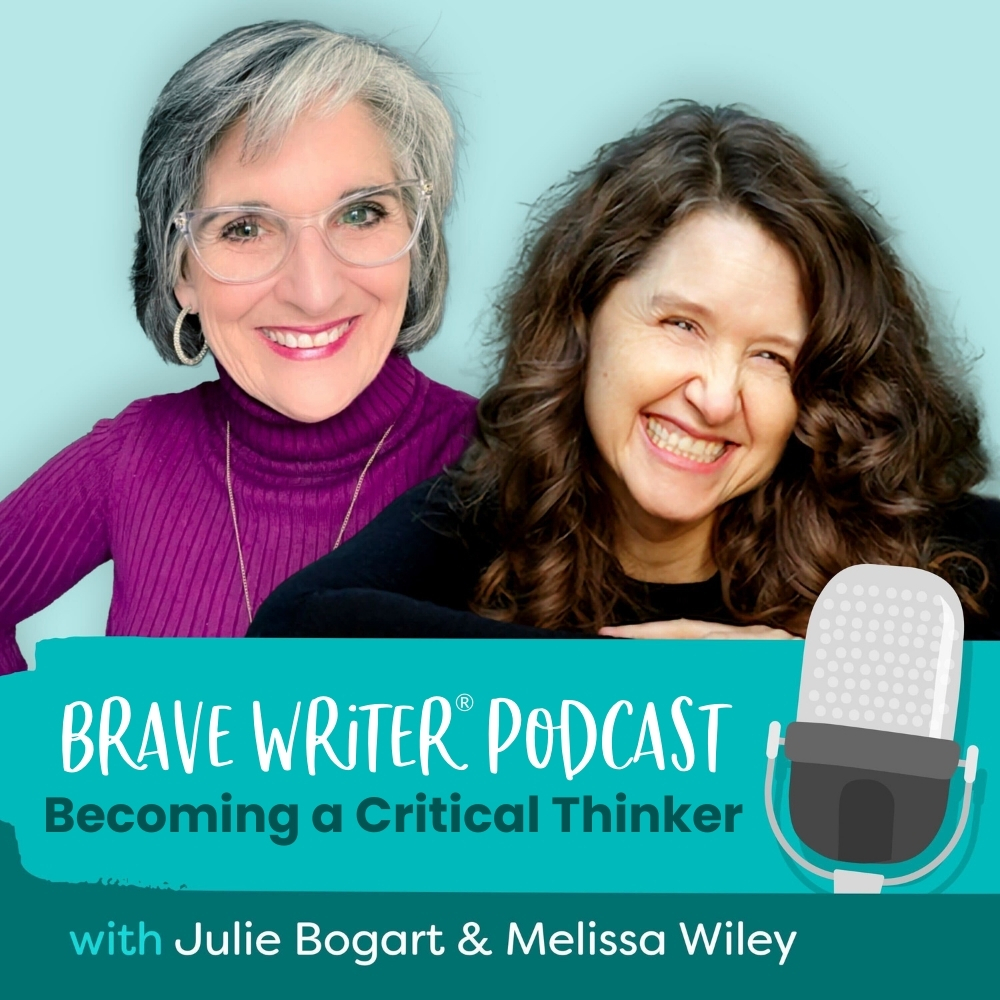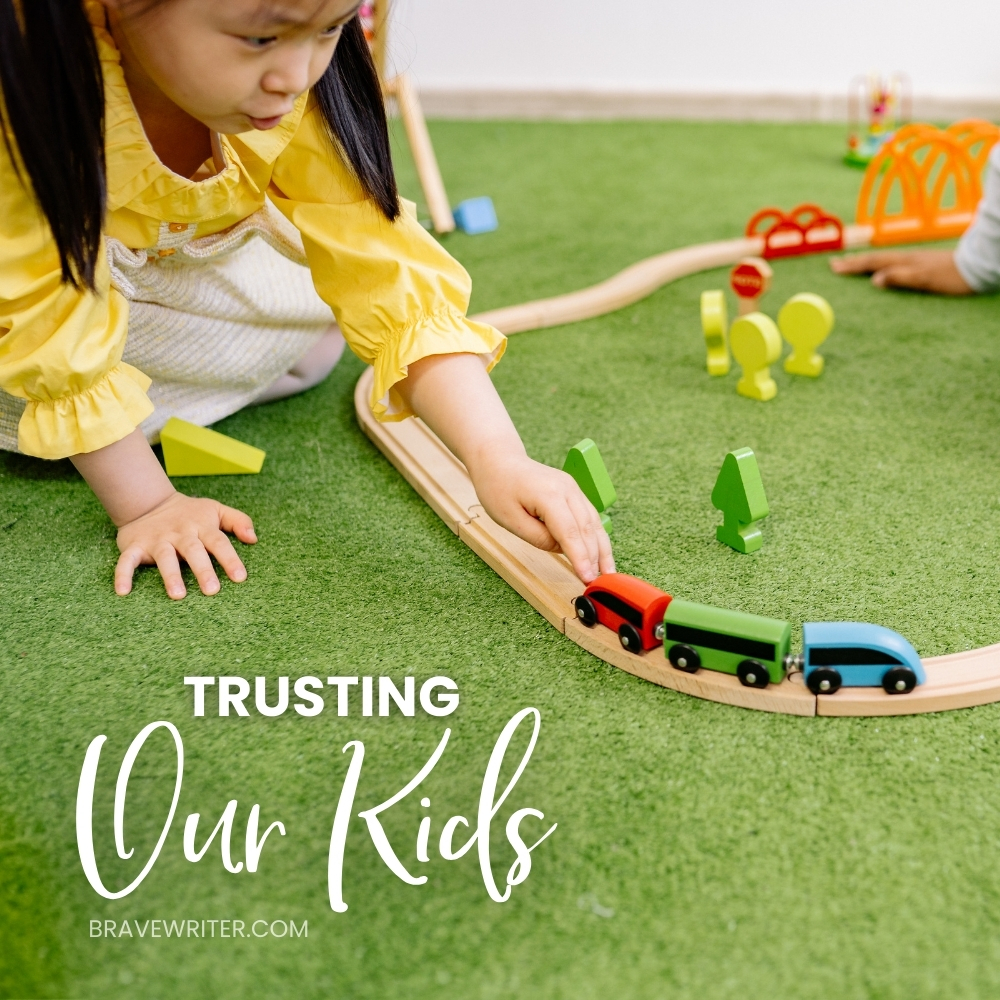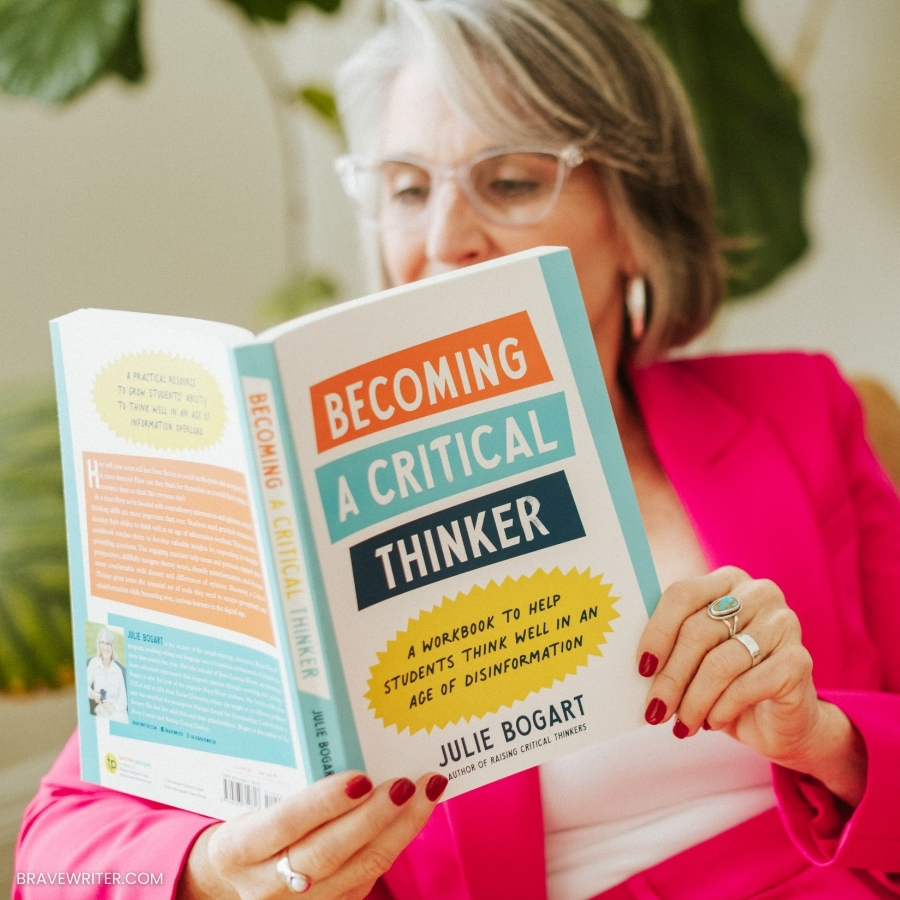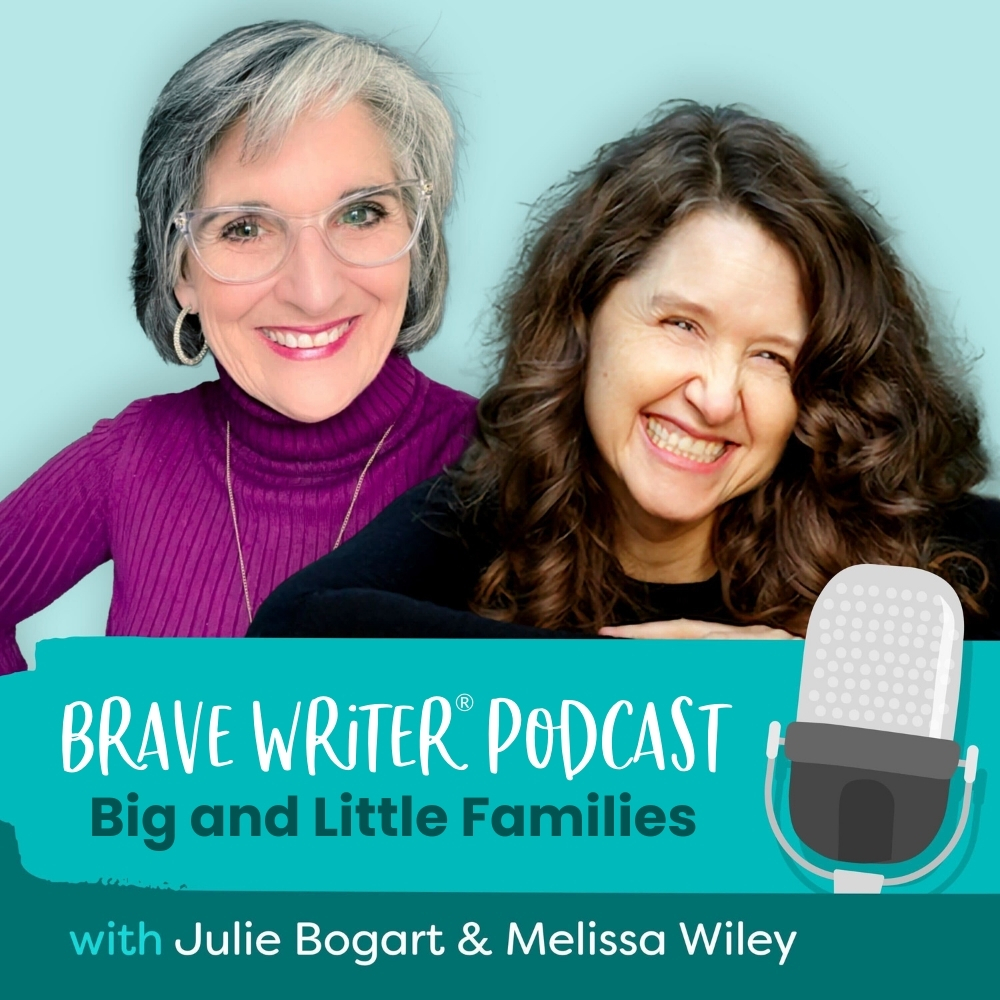
[Podcast #327] Becoming a Critical Thinker

What does it really mean to think critically in a world that never stops shouting at us?
In this Brave Writer podcast episode, we slow things down and explore how to stay grounded when information, emotion, and opinion collide.
We talk about:
- noticing our own reactions,
- asking better questions,
- and learning how to separate facts from the stories wrapped around them.
Along the way, we share practical tools you can use with your kids—and yourself—to build clarity, curiosity, and courage. If you’ve ever felt overwhelmed by the noise or unsure how to model thoughtful engagement, this conversation offers a steady place to begin. Join us, and keep thinking well.
Show Notes
We live in an age of information overload. News arrives faster than we can process it, opinions stack on top of opinions, and emotional reactions often outrun thoughtful reflection. It’s no wonder so many parents feel unsure about how to help their kids make sense of it all. Critical thinking, though often treated as an academic skill, begins much closer to home—in our own habits of mind.
One of the most important shifts we can make is recognizing that critical thinking doesn’t start with evaluating someone else’s argument. It starts with noticing ourselves. Before reading an article, opening an email, or responding to a post, we can ask a deceptively simple question: What do I hope will be true? That single moment of awareness reveals how much emotion, identity, and desire shape the way we receive information.
Right-Sizing Our Reactions
Not every piece of information deserves the same level of alarm or passion. Learning to match our emotional response to the actual stakes of a situation is a core critical thinking skill. Overreacting to minor issues leaves us exhausted. Underreacting to serious ones can be dangerous. When kids see us calmly assess what matters—and why—they learn that thinking isn’t about panic or dismissal. It’s about proportion.
Turning the Lens Inward
An “academic selfie” invites us to examine assumptions we’ve stopped questioning. Why do we label some schools as “good” and others as “bad”? Why do we accept uneven teaching quality in institutions that promise excellence? When we turn the lens inward, we model humility and curiosity. We show kids that growth begins by examining what we take for granted.
Facts, Stories, and the Space Between
Facts never arrive alone. They’re always embedded in stories shaped by word choice, order, and tone. Separating verifiable details from narrative framing helps remove some of the emotional charge. Dates, names, actions, locations, and data give us something solid to hold onto when everything else feels slippery.
At home, this can look like reading two articles on the same topic—without knowing the source—and noticing what feels persuasive, irritating, or comforting. Those reactions are data too.
Curiosity Over Combat
When disagreements arise, curiosity opens doors that confrontation slams shut. Asking someone how their view makes the world better invites explanation rather than defensiveness. It also gives us insight into values, fears, and priorities we might otherwise miss. That same posture helps our kids feel safe bringing us questions that don’t yet have neat answers.
Critical thinking isn’t about winning arguments or proving ourselves right. It’s about developing the courage to look honestly at information, beliefs, and emotions—our own included. When we create homes where curiosity is welcomed and thinking is allowed to evolve, we give our children something far more lasting than answers. We give them the tools to think well.
Resources
- Find Raising Critical Thinkers and Becoming a Critical Thinker on Julie’s website at juliebogartwriter.com
- Brave Writer class registration is open!
- Visit Julie’s Substack to find her special podcast for kids (and a lot more!)
- Purchase Julie’s new book, Help! My Kid Hates Writing
- Find community at the Brave Learner Home
- Learn more about the Brave Writer Literature & Mechanics programs
- Start a free trial of CTCmath.com to try the math program that’s sure to grab and keep your child’s attention
- Subscribe to Julie’s Substack newsletters, Brave Learning with Julie Bogart and Julie Off Topic, and Melissa’s Catalog of Enthusiasms
- Sign up for our Text Message Pod Ring to get podcast updates and more!
- Send us podcast topic ideas by texting us: +1 (833) 947-3684
- Interested in advertising with us? Reach out to media@bravewriter.com
Connect with Julie
- Instagram: @juliebogartwriter
- Threads: @juliebogartwriter
- Bluesky: @bravewriter.com
- Facebook: facebook.com/bravewriter
Connect with Melissa
- Website: melissawiley.com
- Substack: melissawiley.substack.com
- Instagram: @melissawileybooks
- Bluesky: @melissawiley.bsky.social
Produced by NOVA
Trusting Our Kids

It seems the spirit of the age is that parents ought to take control of their children’s lives because the parent knows best and the world is dangerous.
Yet the child knows best what their interior life feels like. Most kids want to have a good and happy life (believe me—didn’t you?) and are not out to get away with anything.
They are learning what is good for them and what isn’t. They cannot always know that on their own.
We’ve forgotten the inner child cry—“I know things! I’m not a bad person. I want to be happy!” We can start here with optimism rather than scrutiny and fear.
We don’t have to…
- treat our children like they’re lying to us or are bent on their own self-destruction.
- lead with suspicion or treating our children’s desires as frightening to us.
- shame them or blame them for wanting what we decided was bad for them (more computer time, extra candy, staying up late, climbing an eight foot wall).
If we start with curiosity and kindness while showing interest in how a child wants to assemble their lives, we may find ideas that help both them and us thrive.
It’s hard for kids to trust their parents when kids feel they aren’t seen as trustworthy themselves.
I wrote a whole book called The Brave Learner to help you find meaningful ways to connect with your children, while trusting them and leading them into a great life that they will enjoy and you will feel good about.
Brave Learning: A Critical Thinker’s Bill of Rights

Recently on Brave Learning…
A Critical Thinker’s Bill of Rights
and responsibilities, for good measure
Have you ever experienced a sudden blast of awareness—what you thought you knew, you now question?
What did that feel like? Disturbing? Anxiety-provoking? Liberating?
Have you ever been in a conversation only to discover that the ideas you hold would injure your relationship if you were to say them out loud?
How did you manage those thoughts and ideas?
Do you ever feel pressured to declare a decided opinion, even when you don’t have the data and education to take a strong position?
Where did that pressure come from? What were the unsaid (or said) consequences of deviating from the group’s approved beliefs?
[Keep reading]
Subscribe to Brave Learning on Substack where we discuss, problem-solve, and create together. Here’s what you can expect: weekly themed content, freewriting prompts, and a podcast for kiddos called Monday Morning Meeting!
[Podcast #326] Big and Little Families

Homeschooling looks different depending on how many kids you’re teaching—and that’s exactly the point.
In this Brave Writer podcast episode, we explore the real-life rhythms of homeschooling in both big families and small ones, offering practical strategies for group learning, one-on-one time, and everything in between.
We talk about:
- releasing guilt,
- using creative resources to keep kids engaged,
- and recognizing the unique opportunities that come with each family size.
Whether you’re juggling many ages or navigating the intensity of homeschooling an only child, this conversation is full of reassurance, ideas, and perspective. Join us—and let’s rethink what “doing enough” really means.
Show Notes
Homeschooling doesn’t come in one standard size. The daily rhythms of a home with six children look very different from those of a home with one—and yet both can offer rich, meaningful learning when expectations are aligned with reality.
Let go of equal time
One of the biggest myths in homeschooling, especially for large families, is the idea that every child must receive equal time, equal attention, and equal subjects every single day. That model simply doesn’t reflect how learning actually works. Instead, homeschooling thrives when we allow learning to happen in shifting configurations: whole-group discussions, small clusters, pairs, and occasional one-on-one moments. These groupings evolve as children grow, and that flexibility is a strength, not a flaw.
Design for real life
In homes with many children, one-on-one instruction often happens outside traditional “school hours.” Early mornings, nap times, evenings, and weekends all count. Learning doesn’t disappear when the clock hits 3:00. Creating space for focused instruction sometimes means letting other children watch a show, work independently, or dive into open-ended creative activities. That isn’t a failure of discipline—it’s a thoughtful accommodation to reality.
The power of open-ended play
Creative stations stocked with materials like clay, watercolors, beeswax, pipe cleaners, and building supplies allow children of many ages to engage meaningfully at the same time. These activities aren’t just distractions. They support fine motor skills, imagination, problem-solving, and sustained attention, while freeing the parent to work closely with a child who needs it.
Small families bring their own intensity
Homeschooling one child or two can feel surprisingly demanding. Without siblings to diffuse attention, the spotlight can feel intense for both parent and child. That’s why parallel learning—working side by side rather than face to face—can be so powerful. Reading together, writing together, or pursuing shared interests lowers pressure and keeps learning relational instead of performative.
Go wide and deep
Only children, in particular, benefit from group experiences beyond the home. Theater groups, clubs, volunteer work, and classes with mixed ages provide collaboration and perspective. At the same time, small families have a unique advantage: the ability to go deep. When a child’s interests drive learning, parents can follow those threads confidently, knowing depth is not the enemy of progress.
Protect emotional space
Sibling comparisons can be especially sharp in families with just two children. Offering different assignments, honoring developmental timelines, and resisting side-by-side comparisons protects each child’s dignity. Learning isn’t a race, and progress doesn’t need to look the same.
Homeschooling succeeds when we stop forcing our families into rigid frameworks and instead build systems that reflect who we actually are. Big or small, every family can create a learning life that is humane, responsive, and full of curiosity.
Resources
- Find great read alouds and read-alones in the Brave Writer Book Shop
- Brave Writer class registration is open!
- Visit Julie’s Substack to find her special podcast for kids (and a lot more!)
- Purchase Julie’s new book, Help! My Kid Hates Writing
- Find community at the Brave Learner Home
- Learn more about the Brave Writer Literature & Mechanics programs
- Start a free trial of CTCmath.com to try the math program that’s sure to grab and keep your child’s attention
- Subscribe to Julie’s Substack newsletters, Brave Learning with Julie Bogart and Julie Off Topic, and Melissa’s Catalog of Enthusiasms
- Sign up for our Text Message Pod Ring to get podcast updates and more!
- Send us podcast topic ideas by texting us: +1 (833) 947-3684
- Interested in advertising with us? Reach out to media@bravewriter.com
Connect with Julie
- Instagram: @juliebogartwriter
- Threads: @juliebogartwriter
- Bluesky: @bravewriter.com
- Facebook: facebook.com/bravewriter
Connect with Melissa
- Website: melissawiley.com
- Substack: melissawiley.substack.com
- Instagram: @melissawileybooks
- Bluesky: @melissawiley.bsky.social
Produced by NOVA
The Enchanted Education: Master Post

Enchantment does not always mean adding more. Sometimes, enchantment means recognizing what your family already does and leaning into it—counting it!
Little moments that make up your day can be encounters with enchantment if you stop to recognize them and soak them up with pleasure and appreciation.
This collection of posts will give you insights into what you should “count” as enchantment, and offer ideas for little ways you can boost your day to connect with your child and up the enchantment in your homeschool.
- Enchanted Education
- What Enchanted Education Is NOT
- Enchant the Environment
- 5 Magic Words
- The Four Forces of Enchantment
- Enchanted Education for Teens
- Keeping Enchantment Alive in High School
- A Little Enchantment Goes a Long Way
For more on this important topic,
check out Julie’s book, The Brave Learner!





















